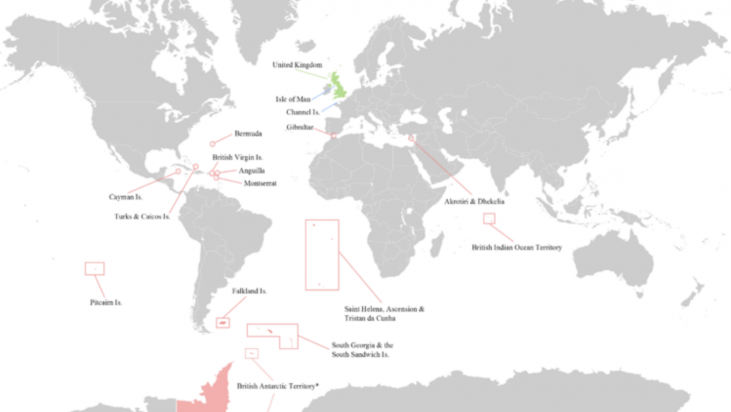Some good news came from the United Kingdom, which accepted, on May 1st, an amendment to its Sanctions and Anti-Money Laundering Bill, opening up the way for public beneficial ownership registries in its Overseas Territories (OTs), including well known notorious tax havens like the British Virgin Islands, Cayman Islands and Bermuda. This public register will have to be put in place before the end of 2020.
This will impact the ability of these jurisdictions to incorporate shell companies with ease and contribute to money laundering and tax avoidance. “The battle however is ongoing as British crown dependencies are not included in this amendment and are thus not required to establish similar public beneficial ownership registries”, says CBGA India’s Neeti Biyani.
As Global Witness points out, public registers of beneficial owners are primarily a victory in the fight against corruption and money laundering, because it becomes much harder to conceal who makes and receives payments, obtains contracts, etc. The registers also help against evasion of wealth taxes, because it becomes easier to detect false ownership declarations intended to thwart exchange of bank account data (all UK territories and dependencies have committed to collect and exchange such data). In addition, public registers help against corporate tax avoidance, because it becomes harder to disguise intra-group transactions as third-party ones.
However, as Oxfam’s Francis Weyzig recaps, “the key problem with corporate tax havens is that they provide a zero-tax environment for profits derived from business activities in other countries. Only when countries like Bermuda and the Cayman Islands stop facilitating such structures, they might no longer be considered corporate tax havens. They have already committed to do something against offshore structures without real economic activity by 2019, under pressure from the EU, yet it remains to be seen if Bermuda will indeed stop granting zero-tax residence to Google Ireland Holdings and the like”.
“Moreover, Weyzig adds, to identify potential tax dodging by multinationals, different types of transparency is needed: public country-by-country reporting and domestic public registers of subsidiaries’ annual accounts.
“The beneficial owner of Nike International Ltd on Bermuda has never been a secret. However, it took the Paradise Papers to find out how much profits ended up there since 2007, and the threat of international anti-avoidance measures to make Nike switch to a NL-US onshore tax-dodging structure no longer involving Bermuda” (Weyzig notes that NL will close that loophole by 2020).
Furthermore, the new rules were welcomed by the Financial Accountability and Corporate Transparency (FACT) Coalition, Global Alliance for Tax Justice’s regional network member in the United States: “The FACT Coalition noted that the move increases pressure on U.S. policymakers to take action against anonymous shell companies registered domestically”. “Crack Down on U.K.’s Offshore Territories Increases Pressure on U.S. to End Anonymous Companies”, FACT states.
Global Witness also reflects on how this big win puts greater onus on the US to follow suit: “This now raises the stakes for remaining jurisdictions – including, and especially, the US – who are happy to sell secrecy. The longer the US delays, the more it cements its status as a top haven for dirty money used to finance all kinds of criminal activity, from terrorist financing to human trafficking and more. It’s only a matter of time until anonymously owned companies are a thing of the past. All eyes are now on the US.”
Global Alliance for Tax Justice’s committed partners all greeted the information:
- “The OTs are relatively small but highly secretive financial centres, UK-based Tax Justice Network explains, responsible for just over 4% of the global provision of financial services to non-residents – but nearly twice that share of our measure of global financial secrecy (see “FSI Share”, below). This table below shows the measures of financial secrecy for those seven Overseas Territories which we reviewed in our Financial Secrecy Index 2018, and which will now be covered by the new measures. Compared to the average secrecy score of 66 for all 112 jurisdictions we reviewed, the average secrecy score of those 7 UK overseas territories covered by the FSI is substantially higher with 74%. This tells you what a significant contribution their secrecy services make globally”.
- Commenting on the amendment becoming part of the Bill, Rebecca Gowland, Oxfam‘s head of inequality, said “This is great news for the world’s poorest people. Ending secrecy in UK-linked tax havens will help developing countries to recoup billions of lost revenue that could pay for much-needed schools and hospitals. These public services can make a massive difference to the lives of the poorest women and girls who most often miss out on healthcare or an education. Thanks to strong cross-party campaigning and public support, the UK is set to show real global leadership by standing up for tax transparency that will benefit both rich and poor countries. Now that the government has committed to this measure, we expect the House of Lords to follow suit.”
- The International Consortium of Investigative Journalists (ICIJ), who revealed many tax evasion and avoidance schemes and data over the past years, gives its media perspective:
“It comes two years after the ICIJ’s Panama Papers investigation showed one in every two companies found in Mossack Fonseca’s files — the controversial law firm at heart of the scandal — was incorporated in the BVI. Mossack Fonseca closed down in March“.
Find out more about #TaxJustice in the UK through its national platform, Tax Justice UK.
